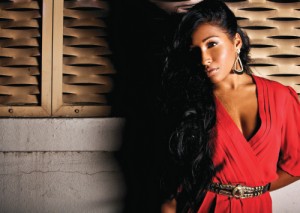‘The Bridge’ to superstardom
Toronto-born singer Melanie Fiona talks about her journey to the top of the charts
BY: DEL F. COWIE
To say things are going well for Toronto R&B singer-songwriter Melanie Fiona would be an understatement. When Sway magazine caught up with Fiona in the midst of her whirlwind schedule, she was in New York City. It was not long after the Grammys, and Fiona scored a nomination for Best Female R&B Vocal Performance for the song It Kills Me. She lost to BeyoncŽ’s Single Ladies — no shame there — she was just happy to be nominated.
“It just took away from the pressure of actually winning the award or not,” she says. “I just wanted to go and have a good time. My parents flew down, they were proud. It was a real dream come true.”
But the highlight for Fiona wasn’t the glitz and glamour of the Grammy gala. That same weekend, a parade of music superstars convened in a recording studio to remake We Are the World for the victims of the catastrophic earthquake that struck Haiti earlier this year. “Coming off the high of the Grammys, I got to see and be around some of the greats in music for such an amazing cause.” Rubbing shoulders with the likes of Quincy Jones, Gladys Knight and Lionel Richie is the result of years of hard work for Fiona, now at a turning point in her career. The aforementioned It Kills Me, from her debut album The Bridge, is a show-stopping ballad that has elevated Fiona into another realm. At the time of this interview, the emotionally charged song, which details the internal conflict and turmoil of a stormy relationship, had been No.1 on Billboard’s R&B/Hip-Hop Songs chart for an impressive eight weeks. For her part, Fiona never doubted that the song would be a success.
“The emotion that It Kills Me has is what makes it so unique,” she says. “We knew that this was our monster record. We knew that when it was time, we were going to hit. But you never really know when the right time is, so we released it as the second single and it just took off.”
The song was co-written by Andrea Martin, a songwriter whose credits also include classic ’90s R&B staples such as En Vogue’s Don’t Let Go, Monica’s Before You Walk Out of My Life and SWV’s You’re the One. However, Fiona’s relationship with Martin goes beyond business. They are now close friends and share the same heritage.
“What! She’s Guyanese,” says Fiona. “That was our first bond when we first met. It was really cool. She actually has the same birthday as my mom. On all levels we just kind of connected and had a lot in common. Now we’re like family, for sure.”
It was actually a family connection that first attracted Fiona to music. Her father played guitar in a Toronto group and her mother loved to sing. People would often ask her to sing when she was young, and while in high school she joined a Canadian female R&B trio called Xquisite, which also featured current MTV Canada host Nicole Holness and Toronto R&B artist Andreena Mill. After they disbanded, Fiona persevered with a solo career, occasionally jamming with local artists. She was even briefly in a group with Toronto hip-hop artist Drake, until she got a break with an L.A. management company while she was what she describes “young, fresh and green.”
“I just naturally fell in the pocket,” she says. “I realized I was going to miss my family’s birthdays, I wasn’t going to be home for every holiday. I was going to have to sacrifice working a regular job, making a steady income to spend money to hopefully make income. It wasn’t easy sacrificing my life, basically, to get here.
“It’s not for everybody. I can’t honestly just turn around and say that if you picked up a plane ticket you could make it too. I know people who quit this race a long time ago because they can’t fathom the thought of being away from their families or not having money or not having a place to live and really struggling.”
Working under the name Syren at the beginning of her solo career, Fiona tried to find her sound by collaborating with a variety of producers. “It took a little bit on a creative level, before I had my record deal, to try to explain to people who I am and where I come from and what that means to my music,” she says. “That was a little bit different. Going [into a studio in] Toronto and being like, ‘I want to do some music that reflects my heritage.’ People would be like, ‘OK, we’ll have a little bit of calypso, reggae, a little bit of R&B and a little bit of pop.’ They would understand that right away. Whereas in the States, I would say, ‘I’m Guyanese.’ [They'd respond], ‘What? You’re from Ghana?’ They didn’t understand the culture and they didn’t understand where I came from. So, it was definitely difficult for me, at first, to find producers who understood the vision of the type of music I grew up listening to.”
Still, for the most part, her realities in the U.S. and in Canada were polar opposites. “I just kinda kept [my career] south of the border. It was kind of like a double life I was living,” she says. “I would come home, go to school. I’d be a daughter, a sister, a friend, a girlfriend in Canada. Then I would leave and be [living] in hotel rooms, and recording and going to events that were kind of unheard of for Canadians. I always kept it that way because I knew that being in the States was work and Canada was home.”
Despite this reality, under the name Syren, Fiona was able to release songs like My First Love, which was remixed into an up-tempo house track, and the Supa Dups-produced Somebody Come Get Me, a selection featured on the Reggae Gold 2008 compilation. The song actually led her to open for reggae legend Beres Hammond in Toronto.
Yet, the business aspect of her career remained firmly in the U.S. and reached a critical point when music executive Steve Rifkind, the founder of influential ’90s hip-hop label Loud and the man responsible for launching the careers of the Wu-Tang Clan and Akon, among others, decided he wanted to set up a meeting.
“My name was kind of floating around because I was shopping a deal,” she says. “Steve set up a meeting and came into one of my studio sessions. I played the music and he was like, ‘Oh, my God. You’re a star! You’re a star! I’m gonna fly you to New York and we’re gonna figure it out.’ He put me in front of his staff and was like, ‘I’ve gotta sign her. I can’t pass on this.’ The next day he put the paperwork in front of me and it was a done deal.
“In the fifth year of my career, I do get to say I’ve had some pretty big names stand beside me in support. From Steve Rifkind to Andrea Martin, you know, Jay-Z to Questlove, Kanye West and now Alicia Keys, as I’m getting ready to tour with her. I can’t take the credit for all of it just being talent. It’s all of the hard work and the music that has gotten the attention and the respect of these people before they had even met me. It’s definitely a great union. As an artist, all you can really hope for is the respect of your peers and people you admire in the industry.”
Admiration from fans is also ever-present, as the public has responded positively to the eclectic brew of music on The Bridge, which, at times, mimes Motown melodies, yet sonically traverses everything from analog soul to lover’s rock and contemporary R&B. Many are also pleasantly surprised by Fiona’s connection to Canada.
“A lot of people think I’m from New York. I’m like, ‘Actually, I’m Canadian and proud to be.’ I’m really happy that I get to be part of the movement that continues to put Canada on the map. People are like ‘Damn. You’ve got Kardinal Offishall, Drake. You had Deborah Cox, Tamia. You have Melanie Fiona now. Maybe there’s something up there?’ There is and there has been for a very long time.”
That something has drawn widespread critical acclaim, leading to opportunities such as Fiona being the voice behind a recent Italian advertising campaign for Martini Rosato. The Bridge is also a testament to her cultural background and the varied musical paths she had already travelled before she recorded the album.
“I grew up in such a multicultural society in Canada; my eyes were exposed to so many different types of cultures, food and people that I’ve always felt that music shouldn’t be for one type of person,” she says. “I just said, ‘I’m going to take a risk. I’m going to be that artist who is going to break all the rules and not put myself into a box and really try and make an album that is consistently varied and diverse.’
“That way, people understand it’s not really about the instruments used. It’s about the feel of the music more than anything. I don’t really classify the music I listen to as black music or whatever. If I like a song because of the way it makes me feel, then that’s what I’ll buy or that’s what I’ll listen to. I just want people’s minds to be open and understand more about why I did it that way and why the music sounds the way it does.”
Leaving it open to interpretation led many tongues to wag about whether the topic of Give It to Me Right, the lead single from The Bridge, was as lascivious as it seemed. It’s something of which Fiona is highly aware.
“Of course it’s wordplay, and it can mean many different things,” she says. “People always think it’s about sex, all the time. Sure, definitely it could be. If you want to use it in that context, why not? But really, if you listen to the words, without the sexy beat and without the singing, if you just think about it, it’s like everybody wants what they want, the way they want it — and they want it right. Like, if you got a bad meal you would send it back to the kitchen. If you were dissatisfied with something you would file a complaint. Give It To Me Right is kind of a motto: This is what I want and I don’t want to have to settle for anything less.
“I think that people feel that way all the time in relationships as well. It kind of became this really cool women’s anthem because it gave women that shake your head, shake your finger, no nonsense attitude. Like, ‘I know what I want and I’m strong.’ That was a beautiful thing for me for women to be empowered by that concept.”
Being empowered is a constant theme that arises when speaking with Fiona. Her next single, Ay Yo, is also her favourite song from The Bridge and draws on this theme. She hopes it can serve as a rallying call for anyone facing difficult circumstances.
Soon, Fiona will be taking the next step in her career when she starts work on her second album and competes to win a Juno for R&B/Soul Recording of the Year. But her goals seem to extend beyond the music industry. Somehow, it’s fitting for the singer, who saw taking part in a charity single recording as being more important and fulfilling than her Grammy nomination.
“It’s been about the music and the music has gotten the attention of the people,” Fiona says. “But now it’s about the movement of what it means to be an empowered artist and young woman, and charitable events and things like that… it’s time to give back.”







Leave your response!